Six things occupational therapists do to promote teaching excellence at the MUHC
A few facts about our teaching OTs.
In 2014-2015:
- 23 OTs spent over 11,189 hours supervising 76 students at the MUHC
- 8 OTs were involved in teaching formally at universities in Montreal
- 10 OTs gave 15 presentations within the MUHC or to one of our community partners
During clinical placements, 99% of students said they were satisfied with their training.
Every year, approximately 100 Occupational Therapy (OT) students are trained and supervised at hospitals affiliated with the McGill University Health Centre (MUHC). This experience offers them complex opportunities to learn and practice in an authentic, fast-paced healthcare environment. To teach and supervise their enthusiastic pupils, MUHC OTs draw on their knowledge, skills and love for their profession.
Here are just a few of the things our therapists do to promote teaching excellence at the MUHC:
1. They offer students a wide variety of opportunities for learning.
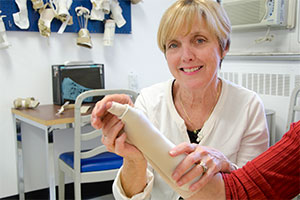
Ann Taylor
“At the MUHC we have the privilege of treating a diverse patient group, so our students are exposed to specialized areas of occupational therapy treatment. They learn advanced anatomy, pathology and clinical presentation of different types of injuries. They also have the opportunity to improve their observational skills, learn interview techniques, increase accuracy and speed in the use of evaluation tools and develop appropriate treatment plans. Working with multidisciplinary teams, they learn about the various roles of each professional and how they collaborate to attain the best outcomes for our patients.” – Occupational Therapist Ann Taylor specializes in the treatment of clients who have sustained traumatic hand injuries and teaches graduate and undergraduate students, mostly from the School of Occupational Therapy at McGill University.”
![]()
2. They teach students to develop themselves beyond the theory.

Anne-Marie Brassard
“Although my ultimate goal is to show students the importance of clinical reasoning, I also believe that flexibility and a real desire to help others are essential to becoming a competent OT. In the acute-care system, situations are constantly changing, and often we need to adjust our interventions. Sometimes it means thinking outside the box to make something work. Moreover, on the day-to-day basis we help our patients not because it’s written in our book but because we care for other humans.” – Occupational Therapist Anne-Marie Brassard works at the MUHC Montreal Neurological Hospital and is currently a mentor in a course that analyzes the healthcare system.
![]()
3. They encourage creativity and dynamism.
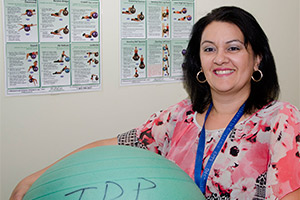
Mireille Boulos
“OT is a creative, dynamic job. Students have to be adaptable and figure out what will be the best approach for each patient. I let my students participate in groups and work on their own, be innovative and try new ideas. Students appreciate the relaxed atmosphere and the fact that their individuality is respected.” – Occupational Therapist Mireille Boulos works in Psychiatry in the Transitional Day Program at the MUHC Montreal General Hospital. She supervises McGill graduate students and some exchange students from Europe, Asia and the Middle East.
![]()
4. They value research-based practice.
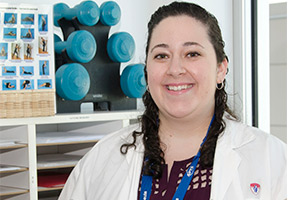
Karen Falcicchio
“We try to incorporate evidence-based practice at the MUHC as much as possible. I share my reasoning with my students, including the research articles I've used to develop my practice. We also have education rounds, focusing on the latest research. Students have a final project where they choose a topic that interests them, research it, and teach us how it can be applied in our setting.” – Occupational Therapist Karen Falcicchio works at the MUHC Royal Victoria Hospital at the Glen site and teaches fellow colleagues and other professionals. She has also taught Cegep and undergraduate students interested in applying to OT.
![]()
5. They learn from their students.
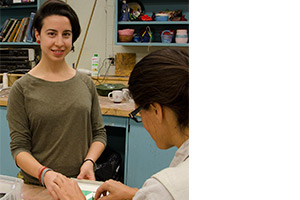
Katrina Ballerini
“We have a lot to gain from students. To teach, we have to sort out our knowledge and present it in a logical manner. That pushes us to question our own practice and to strive to improve it. Students, for their part, bring us the latest research about occupational therapy and their original ideas. That’s why teaching is so rewarding!” – Occupational Therapist Katrina Ballerini works at the MUHC Allan Memorial Institute and teaches graduate and undergraduate students.
![]()
6. They teach their students how to teach!
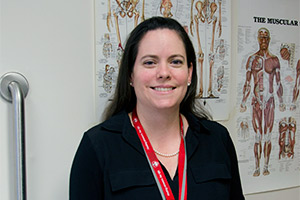
Beth Robertson
“Our patients and their family members are often overwhelmed with a devastating diagnosis. It’s important that they feel supported, listened to, understand their disease and how best to cope. Whether it is teaching a young mother with multiple sclerosis energy conservation techniques, teaching a patient with a brain tumour strategies to deal with memory problems or teaching how to prevent falls to a patient with Parkinson's disease, education is key to keeping our patients safe and in optimizing their functional autonomy. There is no greater feeling than hearing, 'You changed my life'.” – Occupational Therapist Beth Robertson works in the out-patient department of the MUHC Montreal Neurological Hospital and supervises students from McGill University.
![]()
October is Occupational Therapy Month!
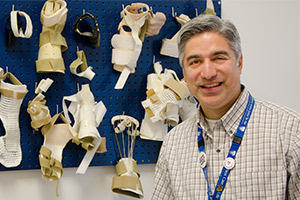
Kashif Baig
The McGill University Health Centre (MUHC) recognizes the hard work and contribution of the more than 60 occupational therapists and support staff who work in inpatient and outpatient clinics throughout the MUHC. “2015 has been an incredible year of change at the MUHC, and occupational therapists have embraced this change,” says Kashif Baig, manager of the Department of Occupational Therapy (Adult Sites). “It’s amazing to think that Occupational Therapy at our hospitals can be traced back to 1938. A lot has changed since then, but not the passion our OTs have in working for the benefit of their clients, co-workers and the institution. They make an outstanding contribution to each and every unit, team and clinic."